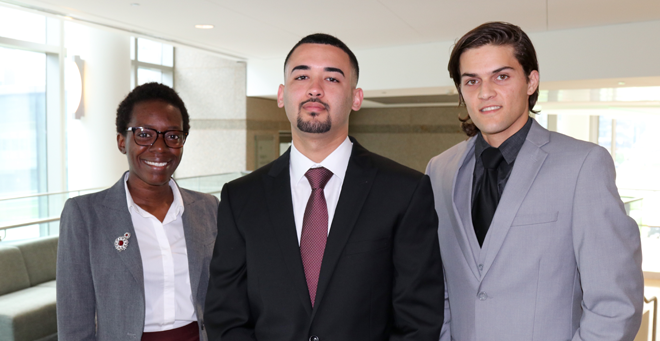 |
|
|
2017 Summer Undergraduate Research Program participants (from left) Fayola Levine, Jake Carrasquillo Rodriguez and Austin Taylor |
Twenty-six college undergraduates have finished trading summer’s surf and sand for centrifuges and pipettes as participants in the 25th annual Summer Undergraduate Research Program at UMass Medical School. Students spent 10 weeks conducting research with UMMS faculty, an immersive and challenging hands-on experience that will help inform their career decisions as physicians, biomedical scientists or both, as MD/PhDs.
“I love everything about the program,” said Austin Taylor, a rising senior at UMass Dartmouth who conducted research in the laboratory of Gary Ostroff, PhD, professor of molecular medicine. Admitting he can’t stand the sight of blood, Taylor intends to earn a doctorate in material sciences or applied engineering, focusing on biomedical applications. “It’s motivating being next to other students who are all putting so much effort into their projects, watching how hard my PI and postdoc mentors work, and knowing that our program coordinators want to help us,” he said.
The Summer Undergraduate Research Program is designed to diversify the pool of biomedical researchers by providing structured, hands-on laboratory research experiences to undergraduate students, especially those from backgrounds underrepresented in the field, or who are economically or educationally disadvantaged. The program provides participants with an immersion in the real world of research, in which they learn together in classes and lectures and conduct experiments using state-of-the-art equipment and techniques in laboratories across campus. Each student conducts hands-on laboratory research with principal investigators serving as mentors, role models and advisors.
“I worked with more sophisticated techniques than ever before. Doing cloning on my own was exciting—even more so when my experiments worked,” said Fayola Levine, who moved to New York City from Trinidad & Tobago at age 12. The rising senior at City University of New York–Hunter College became interested in breast cancer research when she lost an aunt to the disease. Mentored by MD/PhD student Asia Matthew, Levine had her first opportunity to work directly with breast cancer in the lab of Leslie Shaw, PhD, associate professor of molecular, cell and cancer biology. “I was really fortunate and thankful to be able to contribute even in a small way,” Levine said of developing a plasmid Matthew will use in her ongoing doctoral research. Aspiring to a biomedical research career focused on cancer biology as well as medical practice, Levine will be applying to MD/PhD programs, including the one at UMMS, this fall.
Steadfast in his desire to become a doctor, Jake Carrasquillo Rodriguez, a rising senior at Universidad Metropolitano in San Juan, Puerto Rico, said “I enjoy doing basic research that I hope to apply to medical practice.” He now also plans to apply to MD/PhD programs as well as medical schools.
Carrasqiullo Rodriguez is a two-time summer undergraduate researcher at UMMS. “The project was one of the greatest experiences of my life,” he said, eager to return after winning accolades for two poster presentations on the project he completed last summer. “The research I performed helped me develop my skills not only as a researcher but as a presenter as well.”
Levine, Taylor, Carrasquillo Rodriguez and classmates completed their 10-week experience on Friday, Aug. 4, with closing ceremonies featuring a keynote address from Mark Johnson, MD, PhD, chair and professor of neurosurgery at UMMS. Dr. Johnson is an expert on adult hydrocephalus and brain tumors and the inaugural holder of the Maroun Semaan Chair in Neurosurgery at UMMS; he shared his own story of growing up in a poor but highly educated African-American family in Memphis. He described how the educational opportunities and mentorship he was afforded during the turbulent social upheaval of the late 1960s, combined with his own work ethic, led him to his research and clinical career.
“I think my experiences are very similar to yours,” Johnson told the students. “The key to success is understanding that you are unique but the problems you face are not. I hope my journey resonates with your journey.”
The Summer Undergraduate Research Program is sponsored by the Office of Outreach Programs with financial support from the UMMS Office of Research and the National Institutes of Health.
Related stories on UMassMedNow:
UMass Medical School faculty appointed to endowed chairs
Mark Johnson to lead Department of Neurosurgery